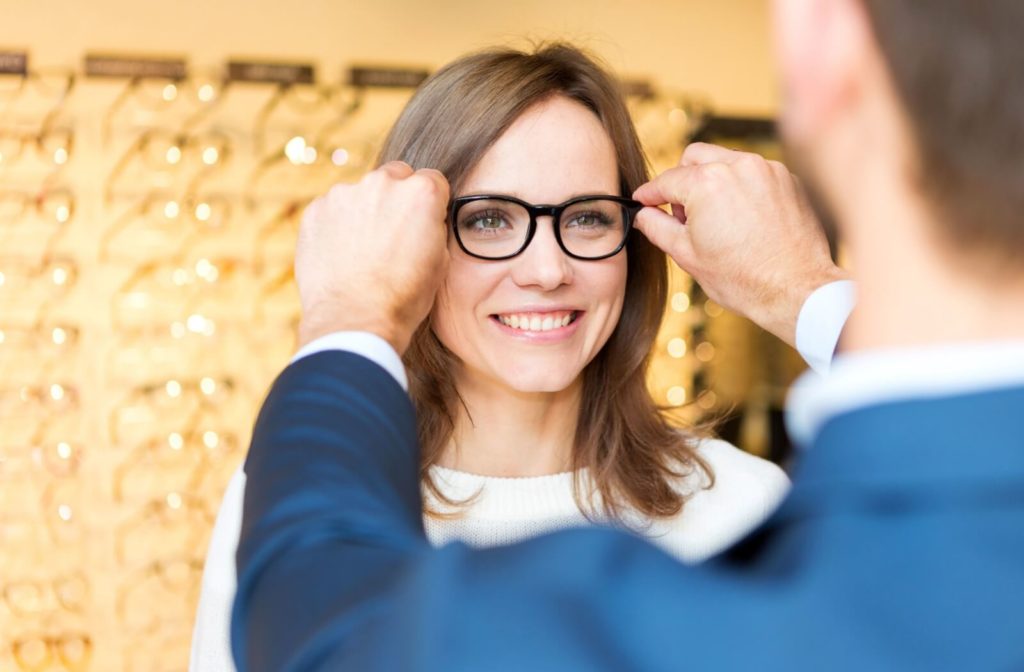Some of us have trouble seeing things clearly up close, like when trying to read a good book or scanning the menu at a restaurant. Fortunately, reading glasses can make things clear and help prevent eye strain. You may wonder if you can just leave them on for all your daily needs. It’s unlikely that this type of glasses will damage your eyesight, but it may not be a good idea to wear reading glasses all the time.
There may be other factors at work if you’re tempted to wear your reading glasses all the time. It’s important to see your eye doctor in cases like this. They can examine your eyes and determine whether you have multiple refractive errors. If so, they can prescribe eyeglasses that enable clear vision that meets all your needs, near and far.
Types of Reading Glasses
There are a few types of reading glasses you can get. Your optometrist can help you determine which could be most beneficial for your vision needs.
Single Vision
Single-vision reading glasses are uncomplicated and singular in purpose, and they are great for tasks that require clarity up close. They’re your partner for reading, sewing, and woodworking—activities where the focus is consistent and near.
Bifocals
Bifocals blend the powers of distance and reading lenses into a single pair of glasses. With them, one can peruse documents on the desk and greet an approaching colleague without interruption. These could have two different prescriptions or simply a magnification in the lower portion for your up-close tasks.
Progressive Lenses
Progressive lenses are the trifecta of viewing ranges—up close, intermediate, and far away—all in one lens. They are the solution for the multi-faceted day in which you must see at various distances. Progressive lenses are typically something you’ll need to discuss with your eye doctor so they can ensure the lens prescriptions are all accurate for your vision needs.
Benefits of Reading Glasses
Reading glasses have several benefits for the individual with trouble seeing things up close.
Improved Vision
The most apparent benefit is clear close-up vision. Even the tiniest print can become legible with suitable reading glasses on. This visual clarity isn’t just for books and screens—it can offer a sharper view of everyday tasks and interactions, improving your quality of life.
Reduced Eye Strain
There’s nothing enjoyable about the headache-inducing squinting that comes with trying to read small text. But donning those glasses can help reduce the strain on your eyes, making your reading and close-up work much more comfortable.
Preventing Headaches
While headaches may not be a common result of eye strain, it’s possible. And reading glasses or specialized computer glasses can help curtail headaches brought on by eye strain. They can do this by reducing the strain on your eyes, fostering a more comfortable day-to-day life.
Potential Risks & Side Effects
There’s no evidence to suggest reading glasses will damage your eyesight or cause you to become dependent on them more than you already are. If you feel you need them more than usual, it’s a good idea to see your eye doctor, as there may be something else affecting your vision. That being said, wearing them when you don’t need them could lead to uncomfortable symptoms.
Eye Strain & Headaches
Ironically, wearing glasses to reduce eye strain today might actually increase it or lead to more headaches. In the same way that an inaccurate prescription can lead to eye strain or headaches, wearing reading glasses could cause a similar strain on the eye’s muscles.
When to Consider Wearing Reading Glasses
Recognizing when you should be wearing reading glasses is an important thing to consider.
Signs of Eye Strain
Frequent headaches, difficulty reading smaller fonts, or even your unexplained need to squint are the red flags. These are your body’s signals that it could be time to opt for the optical aid.
Aging & Presbyopia
The inevitability of aging often includes presbyopia, a natural and common refractive error, where the eye’s lens loses flexibility, affecting the ability to focus on nearby objects.
Professional Recommendations
Visiting your optometrist opens the door to customized advice and prescriptions tailored to your unique vision needs. You should always check with your eye doctor before trying something new to correct your vision.
Choosing the Right Reading Glasses
It’s not enough to grab the first pair of reading glasses you see. There are a few things to consider.
Prescription Matters
The “one-size-fits-all” myth doesn’t hold true for reading glasses. Your eyes are as unique as your fingerprint, and your prescription can be too.
Frame Style
While functionality is key, there is no need to sacrifice style. The array of frames in an optical gallery isn’t just a spectacle display—it’s a variety of choices to suit your style. The right choice can underscore your personality.
Lens Coatings
Lens coatings are additional features that can provide you with more daily comfort. Your optometrist can recommend coatings, such as blue light filters or anti-glare coatings.

Don’t Forget Regular Eye Exams
Whether you’re a literature lover, a computer whiz, or a crossword enthusiast, your reading glasses are there for you. But remember, they’re not your only ally. Regular breaks and eye exercises can keep your vision sharp, just as a varied diet keeps the rest of your body healthy.
And don’t forget those regular eye checkups—your eye doctor can offer insights into personalized care. Contact us at Golden Hills Optometry today to book your next exam.



